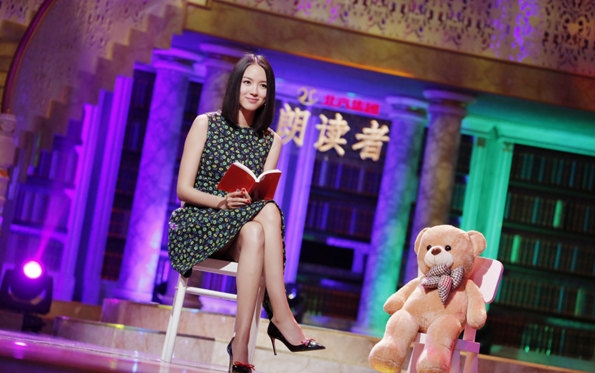TV show ‘Readers’ rekindles love of literature

Miss World Zhang Zilin reads at the Readers show.
When was the last time you read out loud? It might surprise you to realize how long it has been. A new cultural TV program, Readers, recently aired on CCTV after the conclusion of the hit show Chinese Poetry Competition.
The letters read aloud by the guests in the first episode instantly went viral online, triggering a heated discussion on love, life and literature.
“As long as you are a man of integrity, no matter what job you do, you are my good boy.”
“May you have good luck, and if you don’t have it, please learn to have mercy when misfortune befalls you; May you be loved by the people, and if you don’t have it, please learn to be tolerant of loneliness.”
“Life is not the number of days you live. It’s the number of days you remember.”
All the above comments are excerpts from the first episode of Readers read by participants, including veteran Chinese actor Pu Cunxin, Lenovo Group founder Liu Chuanzhi, Miss World Zhang Zilin, eminent Chinese translator Xu Yuanchong and a couple from Sichuan Province. They have been collected by Internet users and quickly spread online to large audiences.
The cultural show is a breath of fresh air in today’s television world where reality shows have dominated, due not only to its simple form, but also its fresh content that refreshes audiences.
After a short conversation between the host and the guest readers, they began to read aloud poems, essays and books they like or wrote. It seems like a simple format, but in reality Readers contains a heavy dose of culture.
Each text chosen for reading aims to convey different ideas, such as the personal growth, emotional experience and life values.
It could have been a hard-to-watch show that would not have resonated with audiences if it only discussed the past and present formally, or only contained serious commentary. The success of Readers depends on the combination of words and people, and the emotion that runs through the whole show, immersing the audiences in thinking about the extraordinary lives of readers in the process of re-reading classic works.
“Life is not the number of days you live. It’s the number of days you remember. You should make every day worth remembering.” It may seem like this is just chicken soup for the soul, not great or bestselling, but when the 96-year-old translator Xu Yuanchong read these words aloud, the power of language touched hearts. Xu has published more than 160 works translated from between Chinese, English and French, but he does not stop working and still adheres to “stealing time from the night if without enough time during the day” in his words, even during periods of ill health.
TV programs like Readers require audiences to be quiet to feel its taste and it will inevitably be considered a niche show in the pan-entertainment television industry. But the first-time producer Dong Qing, also the host of Readers, firmly believes that the show has very real meaning. In her view, reading aloud belongs to all people, not students of certain ages, or a small group of people.
She says: “More than 800 years ago, leading Confucian scholar Zhu Xi said that when reading, you need to read every word out loud. Reading out loud is not only a method of learning, but also a way that people spread ideas, express affection and inherit spirit. So this is our original aspiration to produce the show, we hope it can exert an imperceptible influence on audiences.”
For this aim, a group of enterprising artists, including Chen Weiya, who acted as the director of the closing ceremony of 2008 Beijing Olympic Games, Chen Xiaochuan, editor-in-chief of China Youth Daily, and novelist Liu Zhenyun as well as director Lu Chuan, were invited to create the TV show.
No matter whether they are public figures or common people, the only criteria taken into account when selecting appropriate readers is that they have broad experience and they can touch viewers so that they can better reveal the emotions of the words.
Regarding the reading content, everyone has their own motivation to read aloud, so the content does not matter, but what matters most are the reasons why they read the words, as well as the possible emotional empathy, Liu Zhenyun said.

 PRINT
PRINT CLOSE
CLOSE